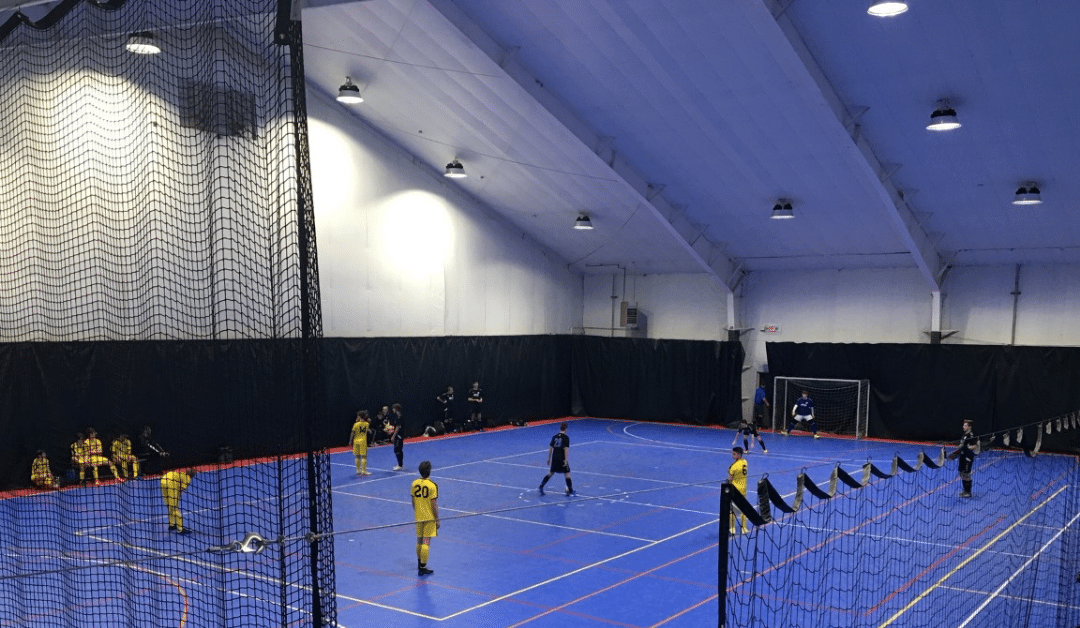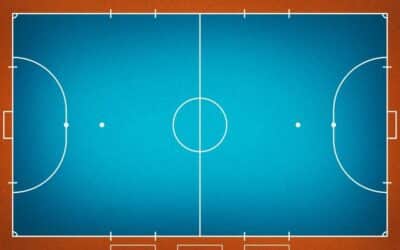If you’re a parent with a child who loves soccer, you may have recently heard about futsal. Perhaps your child’s coach mentioned it as a great winter activity, or your local soccer league sent out an invitation to join a futsal program. But what exactly is futsal, and how does it differ from soccer? Let’s dive into this exciting sport and explore why it’s becoming so popular among young athletes.
The Basics of Futsal
Futsal is a fast-paced, indoor version of soccer that originated in South America in the 1930s. The name “futsal” comes from the Spanish and Portuguese words “fútbol sala” or “fútbol de salón,” which mean “indoor soccer.” Unlike traditional soccer played on a large outdoor field, futsal is played on a smaller, hard court, typically the size of a basketball court.
Here are some key characteristics of futsal:
- Team Size: Futsal is played with two teams of five players each, including the goalkeeper.
- Ball: The futsal ball is smaller and heavier than a regular soccer ball, which helps players develop better ball control.
- Court: The game is played indoors, often on a flat, hard surface without walls. This eliminates the use of boards, emphasizing control and precision.
- Duration: Matches consist of two 20-minute halves, with a running clock and a short halftime break.
- Rules: The rules promote skillful play and quick decision-making. For example, there are no throw-ins; instead, players restart play with a kick-in.
How Futsal Differs from Soccer
At first glance, futsal might look similar to soccer, but there are several key differences that set it apart. These differences not only make futsal unique but also help players develop essential skills that can translate to their outdoor soccer game:
- Smaller Playing Area: The smaller court requires players to think and react quickly. There’s less space and time to make decisions, which helps improve agility, speed, and spatial awareness.
- More Touches: Because of the smaller teams and faster pace, players touch the ball more frequently in futsal than in soccer. This repetition helps hone ball control and technical skills.
- No Walls or Barriers: Unlike indoor soccer played with walls, futsal uses a standard court with clear boundaries. This encourages accurate passing and strategic movement.
- Focus on Skill: Futsal places a heavy emphasis on creativity, dribbling, and close ball control. Players learn to navigate tight spaces and develop their ability to take on opponents one-on-one.
- Goalkeeper Rules: Goalkeepers in futsal play a more active role, often acting as a fifth field player during transitions. This helps young players develop their all-around skills.
Benefits of Futsal for Kids
Futsal offers a wide range of benefits for young athletes, making it an excellent complement to outdoor soccer. Here’s why so many coaches and parents are excited about this sport:
- Improved Technical Skills: The smaller, heavier ball and fast-paced nature of futsal encourage players to focus on close control, quick passing, and precise shooting.
- Enhanced Decision-Making: The game’s rapid pace forces players to think quickly, anticipate movements, and make decisions under pressure.
- Increased Fitness: Futsal’s high intensity keeps players constantly moving, improving their endurance, speed, and agility.
- Confidence Building: With more touches and opportunities to be involved in the game, players build confidence in their abilities.
- Fun and Engagement: Futsal’s fast, dynamic style keeps kids engaged and excited, which is especially important during the off-season.
Why Futsal is Perfect for Winter
For parents wondering how to keep their kids active during the colder months, futsal is the perfect solution. Here’s why:
- Indoor Play: Futsal takes place in gyms or indoor facilities, making it ideal for winter when outdoor fields are often unusable.
- Skill Maintenance: Futsal helps players stay sharp and maintain their soccer skills during the off-season.
- Cross-Training: The unique demands of futsal, such as quick transitions and tight ball control, complement the skills players need for outdoor soccer.
- Accessible for All: Futsal requires minimal equipment, and most programs provide everything needed to play.
What to Expect at a Futsal Program
If your child is new to futsal, here’s what you can expect when they join a program:
- Small Teams: With only five players per team, everyone gets plenty of playing time and opportunities to be involved.
- Structured Games: Matches are typically short and fast-paced, keeping kids engaged and allowing for multiple games in a single session.
- Skill Development: Many programs include dedicated time for skill-building activities, such as dribbling, passing, and shooting drills.
- Inclusive Environment: Futsal programs are often designed to be inclusive and welcoming for players of all skill levels.
Getting Started with Futsal
If you’re ready to get your child involved in futsal, here are a few steps to take:
- Check Local Clubs: Many soccer clubs and community organizations offer futsal programs during the winter months.
- Talk to Coaches: Reach out to your child’s soccer coach for recommendations or information about local futsal opportunities.
- Attend a Session: If you’re unsure about committing, see if your child can attend a trial session to see if they enjoy it.
- Equip Your Child: Most futsal programs require only basic gear, such as indoor soccer shoes, shin guards, and comfortable athletic clothing.
Final Thoughts
Futsal is more than just an indoor alternative to soccer; it’s a unique sport that helps young players develop their skills, stay active, and have fun. Its emphasis on creativity, quick thinking, and technical ability makes it an excellent complement to outdoor soccer. Whether your child is a seasoned soccer player or just starting out, futsal is a fantastic way to keep them engaged and growing as an athlete during the winter months.
So, the next time you hear about a futsal program, consider signing your child up. Not only will they improve their soccer skills, but they’ll also gain confidence, fitness, and a love for a new game that’s taking the world by storm. Who knows? You might even find yourself cheering just as loudly for futsal goals as you do for soccer ones!




Recent Comments